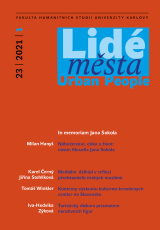Turistický diskurs prizmatem narativních figur
Václav Havel jako ikona boje proti komunismu
DOI:
https://doi.org/10.14712/12128112.2362Klíčová slova:
narratology, collective memory, tourism, Communism, Václav Havel, symbol, metaphorAbstrakt
One of the stories through which tourist guides convey recent Czech history to Western tourists is that of Václav Havel. Because the former president is also presented as a symbol of the Velvet Revolution, his story becomes a part of the story of life under communism in former Czechoslovakia. What narrative strategies are used to create Havel’s portrait? What topics are emphasized? What literary figures are used, and to what schemes do they refer? In other words: what type of literary character does Havel represent? To highlight Havel as a type of a literary character, the hagiographic method is used, in which the real text message is revealed through the individual stories of saints. More of the same schemes, hidden in the deeper layer of the narrative, can be found in the story of Václav Havel. The analysis of the often-repeated metaphors of tourist discourse outlines the role of metaphor in the text. Last, but not least, the text reflects the role of symbolic places, especially how their connection to the story of Václav Havel helps emphasize certain motifs and thus influences not only the final form of the portrait of Havel, but also that of the nation.
Stahování
Publikováno
Jak citovat
Číslo
Sekce
Licence
Copyright (c) 2022 Iva-Hedvika Zýková

Tato práce je licencována pod Mezinárodní licencí Creative Commons Attribution 4.0 .


